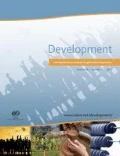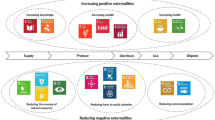Abstract
The contemporary CSR agenda is skewed by the dogma that often limits it to voluntary business activities, by its domination by actors in the North, and its focus on large enterprises. Tom Fox argues there is an urgent need for a more development-oriented approach that focuses on the enabling environment for responsible business in the South and that brings the economic and equity aspects of sustainable development to the forefront of the agenda.
Similar content being viewed by others
Notes
For example, the UN Commission on the Private Sector and Development (2004: ii) notes that a ‘coalition [of the major stakeholders, in the private and public sectors] is essential to unleashing the capacity of the private sector, to achieving the Millennium Development Goals (MDGs) and to alleviating poverty’. See also Nelson and Prescott (2003), which seeks to provide a framework for action on how companies and business coalitions can work with the UN system, governments and civil society organizations to help achieve the MDGs.
See, for example, the discussion fuelled by Christian Aid (2004).
Ward (2003) discusses the importance of factoring legal issues into CSR, pointing to erous examples of interactions between CSR and law.
It is notable that the dominant international CSR agenda has emerged from a subset of even the OECD membership, predominantly the countries of Western Europe and North America.
See, for example, the activities of the CORE coalition at www.corporate-responsibility.org.
This framework was originally developed in the context of an examination of the development dimension of the UN Global Compact. However, its application in other contexts (cf. Ward, 2004) indicates its relevance in the wider agenda.
See, for example, SustainAbility (2001) and Holliday et al. (2002).
Kanji (2004) describes the need to strengthen business incentives for more responsible practice in the cashewnut processing industries in Mozambique and India, focusing on women's employment conditions, given similar conditions.
Fox et al. (2002) provide numerous examples of public sector activities that support CSR, many of which are in developing countries. Further discussion since developing this typology has suggested the possible value of adding a fifth role of ‘demonstrating’.
These categories are adapted from Fox and Prescott (2004).
Developed by the International Social and Environmental Accreditation and Labelling (ISEAL) Alliance, a formal collaboration of leading international standard-setting and conformity assessment organizations www.isealalliance.org.
The ‘bottom of the pyramid’ refers to the emerging consumer market represented by the four billion people with a per capita income of less than US$ 1,500 (Prahalad, forthcoming).
This initiative aims to engage international and national companies, NGOs, labour groups, governments, UN agencies and others to promote the growth of sustainable business in the Least Developed Countries.
Mayers and Vermeulen (2002) draw out lessons from experience of company–community partnerships in the forestry sector, outlining principles and success factors for developing partnerships that deliver better returns to both sides.
References
Christian Aid (2004) Behind the Mask – the Real Face of Corporate Social Responsibility, London: Christian Aid.
Commission on the Private Sector and Development (2004) ‘Unleashing Entrepreneurship: Making business work for the poor’, Report to the Secretary-General of the United Nations, New York: UNDP.
European Commission (2002) Communication from the Commission concerning Corporate Social Responsibility: A business contribution to sustainable development, COM (2002) 347(01), July 2002, Brussels: European Commission.
Fox T. and D. Prescott (2004) Exploring the Role of Development Cooperation Agencies in Corporate Responsibility, London: IIED/IBLF.
Fox T., H. Ward and B. Howard (2002) Public Sector Roles in Strengthening Corporate Social Responsibility: A baseline study, Washington, D.C.: World Bank Group.
Holliday C., S. Schmidheiny and P. Watts (2002) Walking the Talk – The Business Case for Sustainable Development, London: Greenleaf Publishing.
Holme R. (2000) ‘The Creation of Sustainable Livelihoods – The Business Contribution’, Sustainable Development International 2: 43–45.
ISEAL Alliance (2004) Code of Good Practice for Setting Social and Environmental Standards, Bonn: ISEAL Alliance.
Kanji N (2004) ‘Corporate Responsibility and Women's Employment: The cashewnut case’, CRED Perspectives, Number 2, March 2004, London: IIED.
Mayers J. and S. Vermeulen (2002) Company-community Forestry Partnerships: From raw deals to mutual gains?, London: IIED.
Nelson J. and D. Prescott (2003) Business and the Millennium Development Goals: A framework for action, London: IBLF.
Prahalad C.K. (forthcoming) The Fortune at the Bottom of the Pyramid: Eradicating poverty through profit, Philadelphia PA Wharton School Publishing.
RING (2003) The Development Dimensions of the UN Global Compact, London: RING-Alliance.
SustainAbility (2001) Buried Treasure: Uncovering the business case for corporate sustainability, London: SustainAbility.
Ward H. (2003) Legal Issues in Corporate Citizenship, Stockholm: Swedish Partnership for Global Responsibility.
Ward H. (2004) Public Sector Roles in Strengthening Corporate Social Responsibility: Taking stock, Washington, D.C: World Bank Group.
WBCSD (2004) Doing Business with the Poor: A field guide, Geneva: WBCSD.
Rights and permissions
About this article
Cite this article
Fox, T. Corporate Social Responsibility and Development: In quest of an agenda. Development 47, 29–36 (2004). https://doi.org/10.1057/palgrave.development.1100064
Published:
Issue Date:
DOI: https://doi.org/10.1057/palgrave.development.1100064




